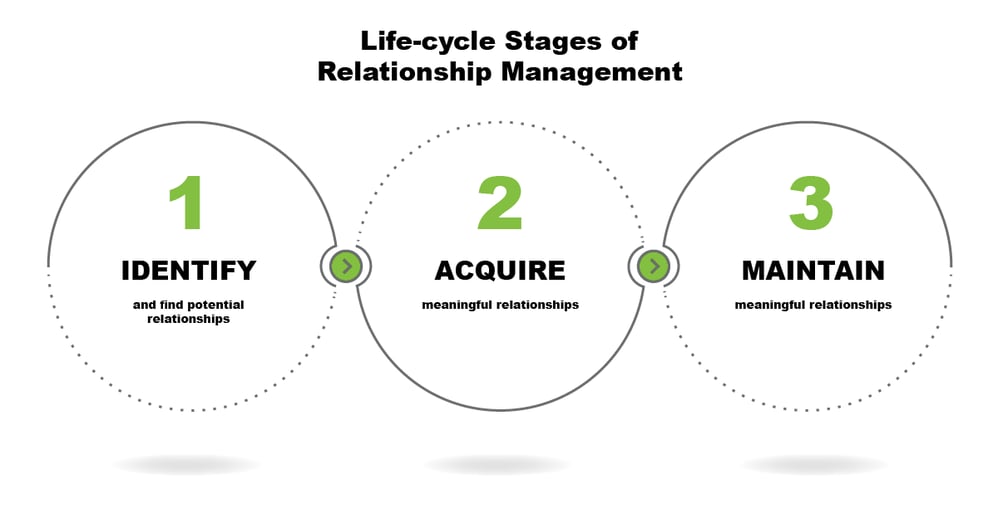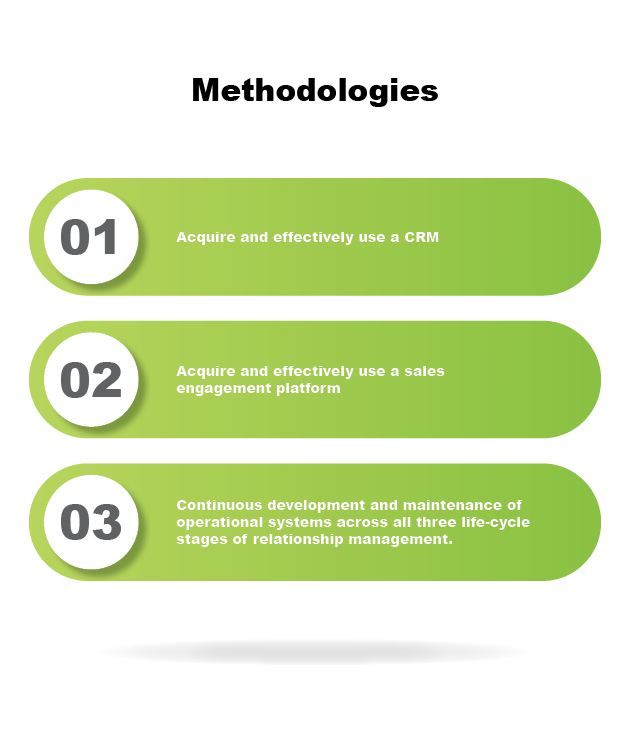Business Relationship Management
Relationships are the lifeblood of a successful business operation. Without them, businesses dry up, wither, and die. Despite its importance, relationship management is overlooked and under-estimated as an essential factor in business success. The best leaders and top executives work every day to remedy these issues of relationship management. When they do, they out-pace and out-perform their business competition. They grow more rapidly and bullet-proof their market position. Customers come, and they stay.
Effective Leaders build revenue and business value. Growing business value requires customers that are meaningfully engaged. Relationship management is the strategy used to stimulate that engagement. The objective of relationship management is not limited to customer engagement. It includes building real partnerships with vendors, suppliers, and employees as well as customers and potential customers.
Creating and maintaining these partnerships is complex. Most organizations fail to establish and maintain systems that support an effective relationship management strategy. Technology can be a useful foundation for relationship management. This article provides essential information to help leaders in the process of developing a competent relationship management strategy.
First, are the three life-cycle stages of relationship management. Next, we share three methodologies. Understanding stages and methodologies will help leaders to develop effective relationship management strategies.
The three life-cycle stages of business relationship management are; Identifying and finding potential relationships, Acquiring meaningful relationships, and Maintaining meaningful relationships.

When leaders are clear about each of these stages in the life-cycle of developing and maintaining relationships, strategies for doing so become easier. Ideas for action and implementation become more self-evident.
The three methodologies are; Acquire and effectively use a CRM, Acquire and effectively use a sales engagement platform, and Devote time and resources to the continuous development and maintenance of operational systems across all three life-cycle stages of relationship management.

Notice that these are labeled as “methodologies,” not just technologies. A common leader error is to mistake technology acquisition for a solution. It is true that technology is an important part of the solution, but it is the skilled USE of the technology that contributes to a competent relationship management strategy. Skilled use of technology requires operational systems and operators who are well trained, highly disciplined, and absolutely determined.
CRMs
Relationship management is in their name, Customer Relationship Management (CRM). The right CRM supports customer relationship management across all three stages of the relationship life-cycle. It supports business efforts to find, acquire, and maintain meaningful relationships. Modern CRMs not only support Customer Relationship Management, but they also support prospect relationship management, vendor and supplier relationship management, and employee relationship management. All of this is possible with the right operational systems.
Choosing the right CRM will take some homework but it does not need to be burdensome. Here are some quick tips.
- If your organization is small, with 1-3 employees and the number of contacts is under 10,000 or so, start by looking at a technology like Keap. It will give you all the power you need while being simple and nimble enough to really do the work.
- If your operations are complex and unique and your organization has a preference for hands-on development, you might start your search with something like Zoho.
- If your organization is a bit larger, with 20 or more employees or 10,000 or more contacts, you will want to go with an industry stalwart like HubSpot. HubSpot is powerful enough for complete enterprise complexity and large operations.
- Although HubSpot can support large enterprise operations, large and sophisticated businesses may also want to look at Salesforce.com
Sales Engagement Platforms
Sales Engagement Platforms may be easily confused with Sales Enablement. Sales enablement refers to the complete technology stack that is intended to support salespeople in their mission to accelerate the closing of more business.
Sales engagement platforms provide cadence technology to help find, acquire, and maintain relationships with a mind-boggling number of relationships while maintaining a personal touch. No other technology empowers relationship management on a personal contact level like sales engagement platforms. This functionality is different that the data management functionality you get from your CRM. It enables salespeople to do more heavy lifting in their sales activity than ever before.
Like CRMs, there are many good options in sales engagement platforms. Users get a solid performance from Xant (InsideSales.com), Outreach, Salesloft, and iLasso. Any one of these products will deliver on the promise of increased productivity and efficacy for salespeople although we confess our bias here for our own product, iLasso. We believe it delivers 2x the power for ½ the price.
Operational Systems
Buying technology is not really the same thing as buying a solution. Operational systems include employee operators and vendor support systems. Make sure your vendor has the skill and ability to meet the needs for implementation, training, and support that will be required. The mission of your vendor should be to help you and your people to be well trained, highly disciplined, and absolutely determined in the deployment and use of technology. They should be committed to supporting the creation and execution of your relationship management strategy.
Creating and sustaining relationships is the holy grail of business success. Business organizations can no longer afford to overlook, underestimate, or ignore the importance of developing a relationship management strategy supported by technology including CRMs and Sales Engagement Platforms.
An article on 9 essential leader behaviors underscores the truth that effective leaders provide resources. Leaders provide training, tools, and technologies that help their people deliver superior results. CRMs and Sales Engagement Platforms do just that.
A 2014 study by Nucleus Research, discovered that buyers received a significant ROI for their investment in CRM systems including technologies for “analytics, social collaboration, mobile, and other capabilities,” in other words, Sales Engagement technology. Their research demonstrated a return of $8.71 for every dollar spent on relationship management systems.
The opinion of Dynamic Consultants is that the ROI for an investment in relationship management technology has steadily risen since the original report in 2014. They believe the return in 2021 to be closer to $30.48 for every dollar spent on relationship management technology.
The time for a comprehensive relationship management strategy has arrived. Every leader concerned about growing revenue and business value will pay attention to relationship management in their organization.
Sign-up for a free consultation on relationship management strategies, CRM, and Sales Engagement Platforms.
You can also learn more about a class on 9 Essential Leader Behaviors for C-Level Executives.





